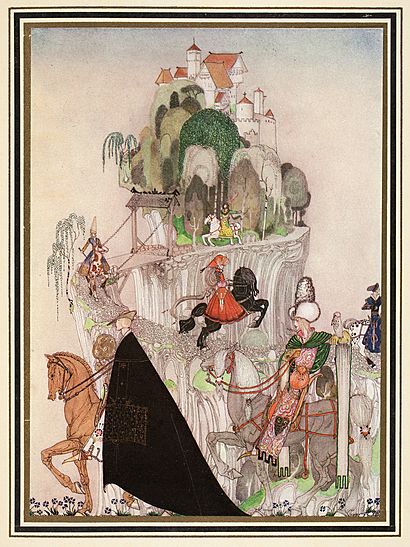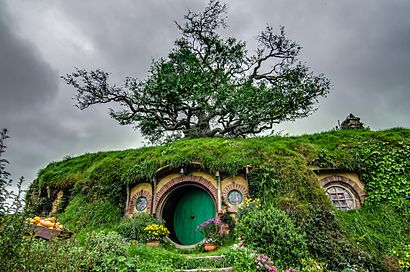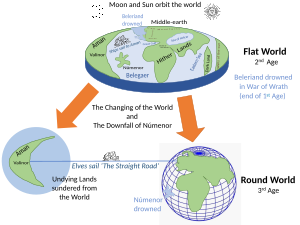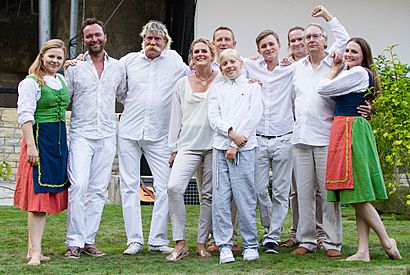The Road Goes Ever On (song) facts for kids

"The Road Goes Ever On" is the name for several walking songs written by J. R. R. Tolkien. These songs appear in his famous stories about Middle-earth. The first song was created by Bilbo Baggins in The Hobbit. Different versions of this song, and other similar walking songs, also show up in The Lord of the Rings.
Many experts believe that Tolkien's "road" is a simple symbol for life and all its possibilities. Middle-earth is full of such roads. Both The Hobbit and The Lord of the Rings start and end at the door of Bag End, which is Bilbo's home. Some think that if "the lighted inn" on the road means death, then the road itself means life. This suggests the songs and books are about a journey of growing up and finding yourself. The song also gave its name to a collection of music by Donald Swann in 1967. All the different versions of the song have been put to music by the Tolkien Ensemble.
Contents
Tolkien's Song Versions
In The Hobbit
The first version of the song is sung by Bilbo in The Hobbit. This happens in chapter 19, when he is almost home in the Shire. He reaches the top of a hill, sees his home far away, and then says these words:
Roads go ever ever on,
Over rock and under tree,
By caves where never sun has shone,
By streams that never find the sea;
Over snow by winter sown,
And through the merry flowers of June,
Over grass and over stone,
And under mountains in the moon.
Roads go ever ever on
Under cloud and under star,
Yet feet that wandering have gone
Turn at last to home afar.
Eyes that fire and sword have seen
And horror in the halls of stone
Look at last on meadows green
And trees and hills they long have known.
In The Lord of the Rings
- Further information: Poetry in The Lord of the Rings

There are three versions of "The Road Goes Ever On" in The Lord of the Rings. The first one is in The Fellowship of the Ring, in Book I, Chapter 1. Bilbo sings it when he leaves the Shire. He has given the One Ring to Frodo and is going to Rivendell. He wants to finish writing his book there.
The Road goes ever on and on
Down from the door where it began.
Now far ahead the Road has gone,
And I must follow, if I can,
Pursuing it with eager feet,
Until it joins some larger way
Where many paths and errands meet.
And whither then? I cannot say.
The second version is in Book One, Chapter 3. It is almost the same as the first, but the word "eager" changes to "weary." Frodo says it slowly as he and his friends reach a familiar road. They are leaving the Shire on their own journey.
The third version appears in The Return of the King, Book VI, Chapter 6. Bilbo speaks it in Rivendell after the hobbits have returned from their big adventure. Bilbo is now very old and sleepy. He murmurs the verse and then falls asleep.
The Road goes ever on and on
Out from the door where it began.
Now far ahead the Road has gone,
Let others follow it who can!
Let them a journey new begin,
But I at last with weary feet
Will turn towards the lighted inn,
My evening-rest and sleep to meet.
A scholar named Brian Rosebury mentions that Frodo remembers Bilbo's thoughts on the 'Road'. Bilbo used to say there was only one Road, like a big river. Its start was at every doorstep, and every path joined it. He warned Frodo, "It's a dangerous business, Frodo, going out of your door." He said you step onto the Road, and if you're not careful, you don't know where you might end up. Rosebury says this means the Road stands for life. It represents the chances for adventure, challenges, and dangers. It also shows the fear of getting lost and the hope of coming home. He also notes that Middle-earth is a world full of roads. Both The Hobbit and The Lord of the Rings begin and end at Bag End.
Another expert, Tom Shippey, compares the songs sung by Bilbo and Frodo. Bilbo follows the "Road ... with eager feet," hoping to find peace in Rivendell. He wants to relax and enjoy his retirement. Frodo, however, sings "with weary feet." He hopes to reach Mordor with the Ring and destroy it. These are very different goals. Shippey points out that if "the lighted inn" means death, then "the Road" means life. This suggests the poem and the story are about a journey of personal growth.
A Different Walking Song

Similar changes in feelings and words appear in two versions of "A Walking Song". These songs have the same rhythm and appear at the start and end of The Lord of the Rings.
The first version is in the chapter "Three is Company." The hobbits sing it as they walk through the Shire, just before they meet some elves. The book gives three parts of the song. The first part starts "Upon the hearth the fire is red...". The following lines are from the second part of the song:
Still round the corner there may wait
A new road or a secret gate,
And though we pass them by today,
Tomorrow we may come this way
And take the hidden paths that run
Towards the Moon or to the Sun.
This part of the song is sung again later in the book with different words. This new version is sung softly by Frodo. He sings it as he and Sam walk in the Shire a few years after their journey. Frodo is getting ready to meet Elrond and others. He will then travel to the Grey Havens to sail into the West.
Still round the corner there may wait
A new road or a secret gate,
And though I oft have passed them by,
A day will come at last when I
Shall take the hidden paths that run
West of the Moon, East of the Sun.
The last line of this song is like the phrase "East of the Sun and West of the Moon." This phrase is used in fairy tales, like the Norwegian story of the same name. It describes another world that is incredibly hard to reach. In Tolkien's world, this refers to Aman, which can only be reached by a special path called the Straight Road.
Music for the Songs
Classical Music
The main song and several others were set to music by Donald Swann. This was part of his book and recording called The Road Goes Ever On. The entire group of songs was also set to music by composer Johan de Meij in 1984. Another setting was made by American composer Craig Russell in 1995. All the songs have been set to music by The Tolkien Ensemble across their four albums. They started with An Evening in Rivendell. This group has now finished their project of setting all the poems in The Lord of the Rings to music. The UC Berkeley Alumni Chorus asked American composer Gwyneth Walker to set the poem to music in 2006. She did this in several different musical ways.
Film, Radio, and Musical Theatre
A musical part of this song by Glenn Yarbrough can be heard in Rankin/Bass's 1977 animated movie of The Hobbit. A full song called Roads was written for the film. You can hear it on the movie's soundtrack. The same tune was used in Rankin/Bass's 1980 animated version of The Return of the King. The song can also be heard in the 1981 BBC radio version. Bilbo (John Le Mesurier) sings it to a tune by Stephen Oliver.
A musical part of the song is in the 2001 movie The Lord of the Rings: The Fellowship of the Ring. Howard Shore composed this music. Gandalf (Ian McKellen) sings it in the first scene. Bilbo (Ian Holm) also sings it as he leaves Bag End. Gandalf's singing is on the track "Bag End" on the Complete Recordings of The Lord of the Rings: The Fellowship of the Ring. Bilbo's part is on "Keep It Secret, Keep It Safe."
Large parts of the song were included in Billy Boyd's "The Last Goodbye." This song was on the soundtrack and in the credits of The Hobbit: The Battle of the Five Armies.
Another song, also by Shore, called "The Road Goes Ever On..." ("Pt. 1" and "Pt. 2") is on the Complete Recordings. It is a version of "The Breaking of the Fellowship" from the 2001 The Lord of the Rings: The Fellowship of the Ring: Original Motion Picture Soundtrack. It includes the song "In Dreams" sung by Edward Ross and James Wilson. It plays softly during the ending credits, after "May It Be".
The 2006 Lord of the Rings stage musical includes a song called "The Road Goes On." Its words are loosely based on Tolkien's poem.
See also
In Spanish: The Road Goes Ever On (canción) para niños
 | Ernest Everett Just |
 | Mary Jackson |
 | Emmett Chappelle |
 | Marie Maynard Daly |


